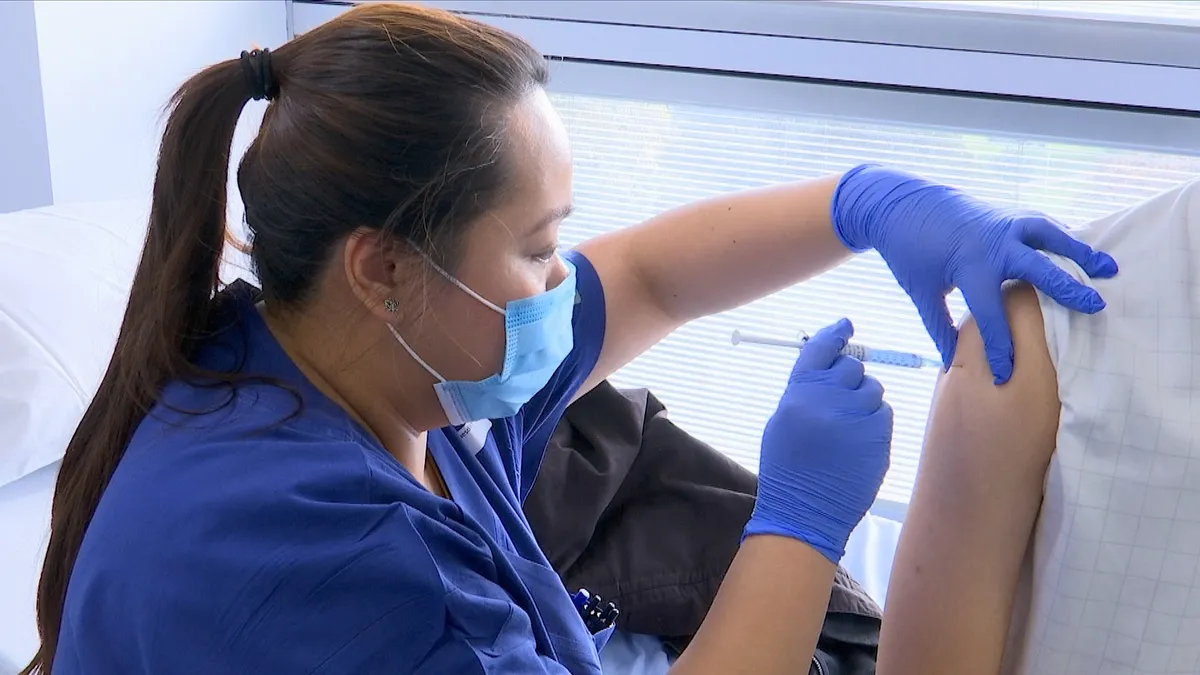Dive Brief:
- Fifteen trade groups representing the food, beverage and CPG industry requested President Donald Trump prioritize COVID-19 vaccinations for workers and establish a federally orchestrated vaccine distribution program. The groups also discussed these issues with President-elect Joe Biden's transition team, United Fresh said in an email.
- The groups, which include the American Frozen Food Institute, the Consumer Brands Association and the North American Meat Institute, sent a Nov. 11 letter to Trump. "Prioritizing vaccinations for food, agriculture, retail, and CPG workers will be a key intervention to help keep workers healthy and to ensure that agricultural and food supply chains remain operating," the groups wrote.
- Pfizer and Moderna have said early results showed vaccine efficacy rates at 90% or above. Some predict a vaccine could be available for priority groups in early 2021. Pfizer and Moderna have said they'd be ready to distribute before the end of 2020 if they're given approval that early.
Dive Insight:
For months, the industry has worked on lobbying government officials to get a vaccine early. In June, the same fifteen groups sent a similar letter asking that food and agriculture workers be given the next highest priority for getting the vaccine behind healthcare workers, first responders and high-risk individuals.
Similar requests have been sent by these groups individually. In September, the Consumer Brands Association sent a letter to the CDC asking for the CPG industry's roughly 1.2 million workers to be prioritized for vaccine allocation.
"Worker absenteeism remains a concern in manufacturing facilities, posing a threat to the maintenance of consistent inventories of life-sustaining products," Betsey Booren, senior vice president of regulatory and technical affairs at CBA, wrote in the letter. "Without early vaccinations, the CPG sector risks the absence of skilled workers due to illness and the subsequent negative impacts on the supply chain."
The Nov. 11 letter says "it is imperative that we have a federally orchestrated vaccine distribution program," but does not mention Operation Warp Speed, which is the public-private partnership led by the federal government to build up manufacturing and distribution capacity for the coronavirus vaccine. It does mention the COVID-19 Vaccination Program Interim Playbook for Jurisdiction Operations, which briefly mentions the operation.
Pfizer also announced Tuesday its plans to pilot a delivery program for the vaccine in Rhode Island, Texas, New Mexico and Tennessee to study potential delivery challenges with the ultra-cold storage that's required for its vaccine, Reuters reported.
The industry's lobbying has worked and many states' draft plans have prioritized food processing and agriculture workers for a vaccine, according to the Food and Environment Reporting Network.
The administration's COVID-19 Vaccination Program Interim Playbook for Jurisdiction Operations considers prioritizing four groups for COVID-19 vaccinations if the initial supply is limited: Healthcare personnel, non-healthcare essential workers, adults with high-risk medical conditions and people 65 and older. In the Nov. 11 letter, the groups said they strongly support the playbook's prioritization of "essential workers in critical infrastructure industries, including those responsible for ensuring the continuity of our nation’s food supply."
During the last eight months, more than 72,000 food system workers tested positive for coronavirus and at least 329 died, according to the FERN. Meat processing plant employees and farm workers have been hit especially hard. When COVID-19 started to rapidly spread in meat plants, many temporarily closed to implement additional safety precautions. Trump signed an executive order in April that used the Defense Production Act to label meat processing as "critical infrastructure" in order to keep plants open and supply flowing.
The group wrote in its most recent letter to Trump that so far "challenges have taxed the food supply chain over the past eight months," but the "supply chains have not broken."
Although many food processing plants implemented precautions such as temperature checks, plastic barriers, mandatory PPE and testing, the coronavirus continues to spread. Amid growing optimism that a vaccine will soon be available, industry groups are moving aggressively to ensure their workers will be some of the first to get it.
















